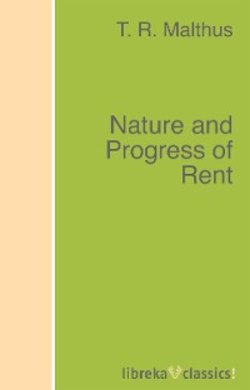Читать книгу Nature and Progress of Rent - T. R. Malthus - Страница 3
ОглавлениеAN INQUIRY INTO THE NATURE AND PROGRESS OF RENT
AND THE PRINCIPLES BY WHICH IT IS REGULATED.
By The Rev. T. R. Malthus
Professor of History and Political Economy
In the East India College, Hertfordshire
LONDON:
PRINTED FOR JOHN MURRAY, ALBEMARLE STREET.
1815.
| Advertisement RENT &c. FOOTNOTES |
Advertisement
The following tract contains the substance of some notes on rent, which, with others on different subjects relating to political economy, I have collected in the course of my professional duties at the East India College. It has been my intention, at some time or other, to put them in a form for publication; and the very near connection of the subject of the present inquiry, with the topics immediately under discussion, has induced me to hasten its appearance at the present moment. It is the duty of those who have any means of contributing to the public stock of knowledge, not only to do so, but to do it at the time when it is most likely to be useful. If the nature of the disquisition should appear to the reader hardly to suit the form of a pamphlet, my apology must be, that it was not originally intended for so ephemeral a shape.
RENT &c.
The rent of land is a portion of the national revenue, which has always been considered as of very high importance.
According to Adam Smith, it is one of the three original sources of wealth, on which the three great divisions of society are supported.
By the Economists it is so pre-eminently distinguished, that it is considered as exclusively entitled to the name of riches, and the sole fund which is capable of supporting the taxes of the state, and on which they ultimately fall.
And it has, perhaps, a particular claim to our attention at the present moment, on account of the discussions which are going on respecting the corn laws, and the effects of rent on the price of raw produce, and the progress of agricultural improvement.
The rent of land may be defined to be that portion of the value of the whole produce which remains to the owner of the land, after all the outgoings belonging to its cultivation, of whatever kind, have been paid, including the profits of the capital employed, estimated according to the usual and ordinary rate of the profits of agricultural stock at the time being.
It sometimes happens, that from accidental and temporary circumstances, the farmer pays more, or less, than this; but this is the point towards which the actual rents paid are constantly gravitating, and which is therefore always referred to when the term is used in a general sense.
The immediate cause of rent is obviously the excess of price above the cost of production at which raw produce sells in the market.
The first object therefore which presents itself for inquiry, is the cause or causes of the high price of raw produce.
After very careful and repeated revisions of the subject, I do not find myself able to agree entirely in the view taken of it, either by Adam Smith, or the Economists; and still less, by some more modern writers.
Almost all these writers appear to me to consider rent as too nearly resembling in its nature, and the laws by which it is governed, the excess of price above the cost of production, which is the characteristic of a monopoly.
Adam Smith, though in some parts of the eleventh chapter of his first book he contemplates rent quite in its true light, 1 and has interspersed through his work more just observations on the subject than any other writer, has not explained the most essential cause of the high price of raw produce with sufficient distinctness, though he often touches on it; and by applying occasionally the term monopoly to the rent of land, without stopping to mark its more radical peculiarities, he leaves the reader without a definite impression of the real difference between the cause of the high price of the necessaries of life, and of monopolized commodities.
Some of the views which the Economists have taken of the nature of rent appear to me, in like manner, to be quite just; but they have mixed them with so much error, and have drawn such preposterous and contradictory conclusions from them, that what is true in their doctrines, has been obscured and lost in the mass of superincumbent error, and has in consequence produced little effect. Their great practical conclusion, namely, the propriety of taxing exclusively the net rents of the landlords, evidently depends upon their considering these rents as completely disposable, like that excess of price above the cost of production which distinguishes a common monopoly.
M. Say, in his valuable treatise on political economy, in which he has explained with great clearness many points which have not been sufficiently developed by Adam Smith, has not treated the subject of rent in a manner entirely satisfactory. In speaking of the different natural agents which, as well as the land, co-operate with the labours of man, he observes, 'Heureusement personne n'a pu dire le vent et le soleil m'appartiennent, et le service qu'ils rendent doit m'etre paye.' 2 And, though he acknowledges that, for obvious reasons, property in land is necessary, yet he evidently considers rent as almost exclusively owing to such appropriation, and to external demand.
